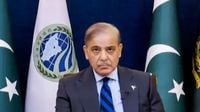On May 9, 2025, the Economic Affairs Division (EAD) of the Government of Pakistan made a startling appeal on X, formerly known as Twitter, requesting international loans to address what it described as "heavy losses inflicted by the enemy" amid escalating military tensions with India and a significant stock market crash. The post, which was tagged with #IndiaPakistanWar and #PakistanZindabad, urged the nation to remain steadfast while calling on the World Bank to assist in de-escalating the situation.
The tweet quickly garnered attention, but not in the way the EAD had hoped. Many users, particularly from India, responded with mockery and sarcasm, suggesting that the appeal was more of a joke than a serious request. The phrase "QR Bhejo," which humorously implies sending a QR code for crowdfunding, went viral as users questioned the credibility of the official account. One user even remarked, "Lmao I double checked if this was a legit handle. It is! 😂"
The context of this appeal is rooted in the rapidly deteriorating geopolitical situation between India and Pakistan, which has been exacerbated since the Pahalgam terror attack on April 22, 2025. This attack, which killed 26 people, prompted India to launch cross-border strikes aimed at terrorist infrastructure in Pakistan and Pakistan-occupied Kashmir. In a controversial claim, Pakistan asserted that it had shot down five Indian fighter jets during Operation Sindoor, although this assertion was met with skepticism, especially after Pakistan's Defense Minister Khwaja Asif cited only "social media" as evidence.
Amid these tensions, Pakistan's economy is facing severe challenges. A $7 billion bailout from the International Monetary Fund (IMF) secured in 2024 is under strain, with India reportedly urging the IMF to review its loans to Pakistan in light of the recent hostilities. The EAD's mention of a "stocks crash" coincides with global economic turmoil, although specific data regarding Pakistan's market performance remains unverified.
As the situation unfolded, the Pakistani government backtracked on the loan appeal, claiming that its official X account had been hacked. The Ministry of Foreign Affairs Fact Checker labeled the post as "fake" and stated, "The account was hacked." This claim raised eyebrows, as many questioned whether the appeal was genuine or merely a poorly written internal message that was later misattributed to a cyberattack.
On the morning of May 9, the Pakistan Stock Exchange (PSX) staged a modest recovery following a historic plunge the previous day. At 10:20 a.m., the benchmark KSE-100 Index was trading at 105,789, up 2,201.33 points or 2.13%. This slight rebound followed Thursday's sell-off, where the index had plummeted 7.6% to an intraday low of 101,598.91 before closing at 102,674, down 7,334.93 points or 6.67%.
The market volatility is unfolding against the backdrop of escalating military tensions between the two countries. On the night of May 8, the Indian Army successfully repelled multiple drone attacks and ceasefire violations by Pakistan along the western border and the Line of Control (LoC). The Indian Army reported that Pakistan Armed Forces launched numerous attacks using drones and other munitions, which were effectively countered.
Colonel Sofiya Qureshi of the Indian Armed Forces stated, "Pakistan escalated the situation; we merely responded. The choice to de-escalate rests with Pakistan." This sentiment was echoed by Indian Foreign Secretary Vikram Misri, who emphasized that India’s military actions were targeted and necessary in response to Pakistan's aggression.
In the wake of these developments, the Pakistani government is grappling with significant economic distress. Pakistan is currently the IMF's fourth-largest debtor, with an outstanding debt of approximately $8.8 billion. Moody's has warned that sustained escalations with India could further harm Pakistan's economic growth and macroeconomic stability.
Despite the government's claims of a hack, skepticism remains regarding the authenticity of the loan request. Observers noted that Pakistan has historically sought assistance from international lenders during times of economic hardship. Critics questioned whether the appeal was a legitimate call for help or simply a poorly constructed message that spiraled out of control.
As tensions continue to rise, the international community watches closely, particularly with an important board meeting of the IMF approaching. India's executive director at the IMF is expected to present India's position regarding any potential financial assistance to Pakistan, casting further doubt on the likelihood of a bailout given Pakistan's track record with previous IMF packages.
In summary, the situation between India and Pakistan remains precarious, with military tensions escalating and economic challenges mounting. The viral appeal for loans from Pakistan's Economic Affairs Division, now disowned by the government as a result of alleged hacking, illustrates the depths of the crisis facing the nation. As both countries navigate this tumultuous period, the potential for further conflict looms large, with both military and economic repercussions at stake.



